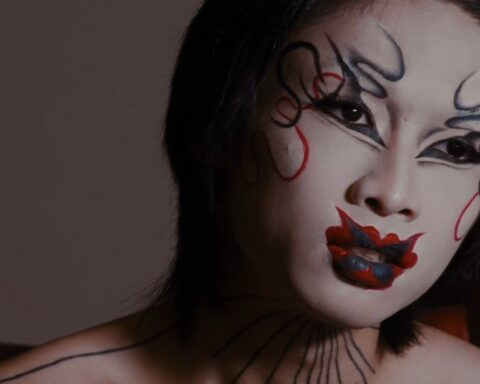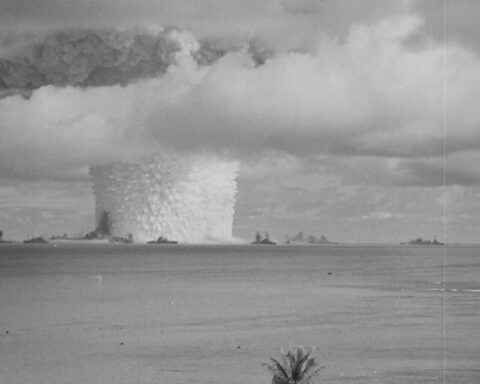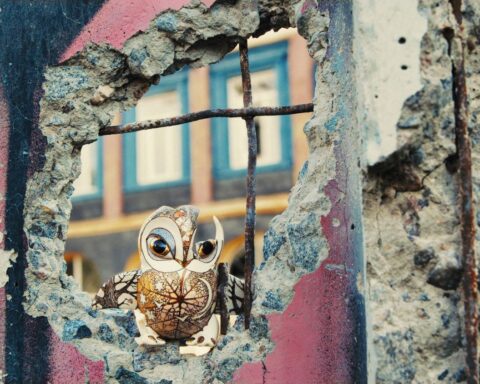Of Fathers and Sons
(Germany, Syria, Lebanon, Qatar, 99 minutes)
Dir: Takal Derki
Programme: International Feature Competition
A powerfully disturbing film, Of Fathers and Sons transports you into the daily lives of a Syrian al-Qaeda family. Given the doc’s intimacy and its revelations about its subjects, you wonder how Takal Derki, posing as a pro-Jihadist filmmaker, won over Abu Osama, leader of al-Qaeda’s Al-Nusra Front. Then again, for Abu Osama, his comrades, and eight sons, violence, war and death that seem shocking to outsiders are just plain normal down in their bleak, arid world.
An affiliate of al-Qaeda, Al-Nusra is a hard-core group burning with a dream of the Caliphate they will create once they destroy the Syrian army, not to mention as many infidels they can take down. The group feels nothing but hatred for “moderate” Syrian rebels supported by the despised Americans. In one scene, Abu Osama drives through the desert singing heartily along with a tune blasting from the radio. It’s not “We Will Rock You”; it’s a ditty about burying enemies who protect Israel.
In many scenes, Derki focuses on Abu Osama’s genuinely loving relations with his sons, particularly Osama and Ayman, named of course for bin-Laden and al-Zawahiri, the current leader of al-Qaeda. Abu Osama cuddles his sons, laughs at their antics, showers them with kisses, and clowns around with them. Cinematographer Kahtan Hassoun gets in counting-the-pores close in these moments. Throughout the movie his camera synchs to faces, movement, and the almost other-planetary desert landscape where the film unfolds. A sequence showing Abu Osama humiliating probably doomed prisoners-of-war in a courtyard closes on a young guy, a single tear on his cheek. In a shocking and revealing scene, Abu Osama tells us that he prayed to have children on 9/11 during that glorious, sacred moment when the World Trade Centre crumbled in flames.
At the beginning of the doc, one of the kids clutches and pets a tiny bird, and Abu tells his son not to harm it. Like everything else in nature, it’s a gift from Allah. Later on, the bird gets injured, and to prevent it from suffering, the boy saws off it’s head. Perhaps I was hallucinating when I heard the contented child say, “Just like when you cut off that man’s head, father.”
Father knows best, and Allah knows better. Near the doc’s conclusion, Abu Osama, now recovering from injuries caused by a landmine, slaughters a sacrificial sheep. He thanks Allah for allowing Abraham to sacrifice a ram instead of his son. Almost jokingly, he says that if God hadn’t made that stipulation, he would have to slaughter one of his sons. While Abu and his buddies continually make teasing mock threats against the boys, you get the impression Abu means it. He is guided by a vision of his God.
As for the women in the lives of these warriors, they are invisible throughout most of the doc. As one critic has pointed out, this could have been a condition of access to the family, but it also makes a point. We are seeing a world beyond macho. For Abu Osama and his chuckling pals, women are a joke and a nuisance, at best servants.
When Abu gets injured so badly we observe him groaning and begging for Allah’s mercy, he orders his loudly lamenting off-screen wives to shut up. When his boys mischievously throw stones at female cousins leaving their house, he’s amused and beams at the idea of blowing them up if they don’t wear hijabs. Wives get jealous of each other, he tells a friend, but overall marital relations are good. His two wives can do the work of four.
Much of the film crosscuts between Abu’s routines (shooting people from a sniper position, disarming landmines, planning attacks) and his sons playing with their friends. The boyish running, jumping, and mischief making don’t seem entirely innocent in this context. Osama, who as the film progresses looks more and more predatory, seems to enjoy bullying people. In one scene, the kids do daredevil leaps over a homemade explosive they knew how to concoct until it blows up.
Of Fathers and Sons climaxes when Osama and Ayman are inducted into a Jihadist boot camp. We’ve seen the boys in shorts and t-shirts. Now they are outfitted in camouflage uniforms and scary black balaclavas. They march, climb walls, jump through fire hoops and crawl around while instructors fire what are probably live bullets all around them. Of course, Sharia law is drummed into them.
The sequence is a vision of the future. The sons are learning their fathers’ longing for fighting, their commitment to the endless war envisioned by George Orwell in the dystopia of 1984. “Long live Jihad,” says Abu. “Fight the enemies of God!” He believes that mostly secular Europe is fighting a Christian Holy War.
The only glimmer of hope in the dystopia Derki brings us into comes from Ayman’s reluctance to become a warrior ready and willing to die. He’d rather be a teacher, and in a scene with Osama, he reads from a sci-fi story in which a magical alien teaches humans about love and compassion. Naturally, Abu thinks Ayman is weak.
At the end of his haunting film, Derki says in voiceover that his “homeland bears no resemblance to the one I once knew.” Whatever their grievances against the Syrian government and foreign interlopers, Abu Osama and Al-Nusra are not creating a Caliphate with “justice for all,” as he says. They are creating hell on earth.
RIDM runs Nov. 8-18.
Visit the POV RIDM Hub *for more coverage from this year’s festival.











